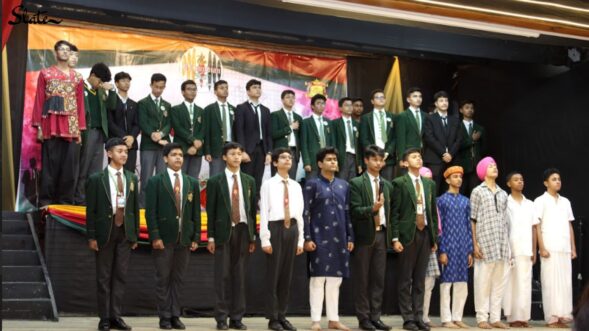
By Ravindra Bhalerao
I had returned home in the evening with my parents after an extended shopping trip in Laitumkhrah and now I was done for. There were loads of groceries to buy, a kerosene lantern to hunt for, and a new typewriter ribbon to buy for the Remington. Most importantly, our Pye radio set had given way, so we had to hunt for a radio shop where those old valves could be replaced. How else could we tune into Radio Ceylon and All India Radio?
I unloaded the groceries, popped in a cookie, and strolled out into our verandah overlooking the Fire Brigade station. In the darkness, the hillside glowed with clusters of light, bright and clear. Every now and then as the pines swayed in the breeze, the lights flickered, went out, then came on again like fireflies on the marsh.
A cold mist had begun to drift in, it had grown intensely cold, and as mamma set about brewing a potful of steaming tea, I got to work with lumps of coal, building up a fire in the fireplace.
Ah, the joy of drawing up a chair by the fireside! It was our custom, if there was nothing to do in particular, to switch off the light for a while as we sat by the fire. Even as the wind set up a howl without, and the windows rattled and the rafters creaked and groaned, we found warmth and comfort in this retreat by the fireside. The crackle of the fire was like music to the ear; clouds of sparks would go up the chimney spreading a cheerful warmth and light all around.
I woke up in the morning rubbing my eyes to six beats on the gong at the Fire Brigade station across our home. The storm had subsided, it was a bright Sunday, and I could indulge myself, perhaps reading Enid Blyton story books.
Breakfast done, I strolled out into our balcony, a Naga shawl thrown around my shoulder, carrying my cup of tea. Even as the sun began to cast long shadows there came the musical peal of church bells from the Seventh Day Adventist Church next door. By and by, as I stood watching, there appeared groups of colourfully dressed folk leisurely walking up to church with rosy-cheeked children carrying hymn books with them. It warmed my heart to watch children leading the way, so young and docile, arriving in church with hymnbooks in hand. ‘..A little child shall lead them…’ I thought.
Life in those days found its joy in the simple pleasures of life, and Shillong was not without its share of amusements. There were the pictures, sure enough, and I remember watching ‘The Towering Inferno’ at Anjalee cinema, as well as several others in Singhania talkies and other cinemas across the town. Kelvin Cinema back then had begun a tradition of screening classic Hindi movies, one show each day. When Dev Anand’s ‘Kala Bazar’ was advertised, father took us along for the 6 o’clock show. There was hardly a rush, seats were easily available. Once inside the hall, we met an elderly Khasi gentleman and father got talking to him. Like us, he too loved old Hindi movies, he said, and he often sought out Kelvin as no other theatre in town cared to show black and white films.
For our younger readers, I will say that movies in the theatres those days were shown on cinematograph projectors, massive six feet high machines securely bolted to the floor, the film itself being spooled up in reels. During operation, the machine made quite a loud whirring noise if you were standing next to it. The finest precision film projectors came from a German manufacturer named Cine Bauer. Anjalee cinema had two of these Bauer film projectors, as I would discover when I once stepped in to see the projection room, whilst Dreamland was luxuriously equipped with three machines.
Then there was a time when someone had arranged an open-air movie show on the Fire Brigade ground itself opposite our home using a small portable projector and screen. It was an old Hindi movie named Brahmachari. So great was the excitement aroused by the news of the show that an enormously large crowd of people from the adjoining area had assembled, myself included, to watch the show.
There were other pleasures too, of a more simple kind. Pleasures such as trekking up a lone hill carrying along a pair of binoculars. Or writing epistles to distant friends and dear ones. Then again, at Christmas time, we found our joy in doing up our Christmas cards and mailing them through the post. The absence of instant communication such as that made possible by the internet these days is one of the things that made postal communication as well as close personal relationships so very valuable in bygone days.
Christmas was celebrated with great fervour and zest in the city what with church bells pealing and groups of cheerful young people going around singing carols, and topping it all, a splendid Christmas church service.
The peal of a church bell has always held me enthralled. The sweetest chimes in Shillong rang out each week from the All Saints’ Cathedral opposite the State Library: so pure, melodious, and divine, like a choir of angels playing on a harp. I adored the peal, it was all so musical, so inviting. It was heavenly, calling forth townsfolk to join in worship.
On Christmas Day once, I found myself pleasantly surprised to find two men in church who I instantly identified as city bus conductors who had arrived for the service. As a young college lad, I held these men in the highest regard; they were among the heroes who ran the fleet of buses in the city. The service over, I hunted up the men, walked up to them, and greeted them. I was honoured with a warm handshake together with a ‘Happy Christmas’ from each of them!
Shillong in the seventies and eighties possessed a culture characterized by an easygoing charm and a simplicity of a quiet life that made no rush for material gain. It was a life free from the stress and frenzied hurry that are a hallmark of heavily populated towns these days, a life revolving around things that brought true value to it.
People would leisurely stroll out in the evenings to the brightly lit bazaar, others would choose to spend a quiet evening by the fireplace reading a book, whilst some would meet in restaurants or newspaper shops discussing the latest trends. The world clearly was a much friendlier place then.
Evenings often found us going out to meet friends in Laitumkhrah. On the way home we would shop for various necessaries, before turning into the hallowed portals of the most famous confectioners in town: G. Guidetti & Sons.
Oh, the aroma of freshly baked loaves of bread! Owned by an Italian family, Guidetti was a legend in its day; it was highly regarded for its delicious cakes and cookies.
Once inside the bakery, it felt much like being inside an old English inn. At the counter there stood a portly lady showing us her wares, the cakes and buns and loaves she had baked. There was a longish glass case behind which could be seen the most tempting cakes, scones and goodies. And at one end of the large hall there was what seemed to be a firehole door leading perhaps to a coal oven. Someone from the works would periodically come in to stoke the fire or adjust the loaves inside.
The entrance gate leading to Guidetti’s Bakery struck me as being singularly elegant. It was charming. This was no signboard painted in cheap, garish colours. Instead, you walked along the street and came upon a gate with a cast iron archway. High up on the archway were the words G. Guidetti Confectioners (or was it Guidetti & Sons?) set in cast iron letters with its flowers and flourishes, inviting the visitor in a fashion reminiscent of Victorian times. You stepped through the quaint little arch and came upon a flight of stone steps flanked on each side by a garden containing an assortment of flowers. Guidetti’s place was truly elegant.
Those who have been through those times will recall that other than being a confectioner, Guidetti also owned a book-lending library. And what a vast collection of books they had! Guidetti held in stock a remarkable collection of rare and old Mills and Boon romances for its female clientele, and if memory serves me right, a good number of detective novels as well. The books could be seen all stacked in a row behind a polished glass case, and you were allowed to walk up and inspect the collection before taking your pick.
Sadly, in later years, we were required to vacate our home at the Fire Brigade and seek accommodation elsewhere. We took up residence in a timber cottage quite similar to the first, nestling in an area nearby called Jingkieng.
I was greatly disappointed with the move. No more would I get to hear the friendly beats on the Fire Brigade gong, and I missed the warmth of sunshine and the sweeping view of the open ground. But there were compensations we had never dreamed about. The new home had plum trees in its backyard which gave their fruit in their season: rich, melting plums, wine red, and ready to be eaten without further ado. I would collect basketfuls of the fruit to be given away to friends and neighbours. Mother would sift through the heap, and the ripe, bursting ones were destined for the cooking pot for making jarfuls of jam that would last us all through the year.
And thus the days wore on, calm and placid like the still waters of a lake on a bright summer day. Life was rich and full of promise. The picturesque homes set amidst forests of pines soothed the eye, and the hills rising in the distance inspired the soul. It was a restful way of life centred on work, a way of life that found its joy in the natural beauty around, and in deep interpersonal relationships distinguished by a sense of warmth, camaraderie, and caring that seemed to have all but vanished in this age of technological innovation.






